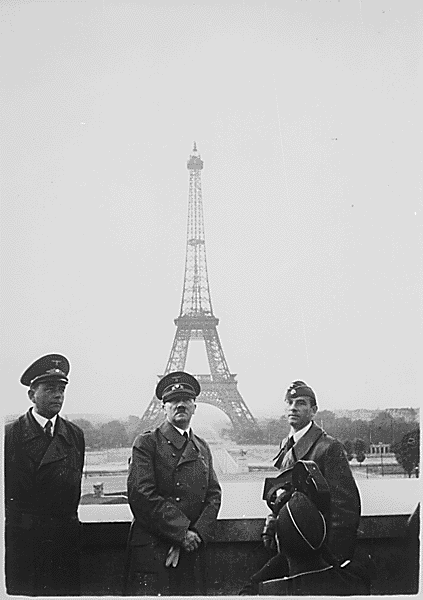June 23, 1940 - Adolf Hitler in Paris
Pictured here, in perhaps his moment of greatest triumph, few men in modern history have had an impact on both European and world history as did Adolf Hitler.
Adolf Hitler was born an Austrian on April 20, 1889 in the town of Braunau am Inn. Hitler came from a lower middle class background, his father worked as a customs official however both Hitler's father and mother died when Hitler was young. Hitler wandered through his adolescence and was in Munich when the First World War began. Upon hearing war had broken out he enlisted in the German army. Hitler served in the German army with distinction, winning the prestigious Iron Cross Second Class and Iron Cross First Class.
As the German army retreated in 1918, Hitler, whose most formative years during young adulthood were spent in the trenches on the western front, could not accept Germany's defeat. After the war Hitler, in September 1919, joined Anton Drexler's German Workers Party - based out of Munich in the German province of Bavaria. Party membership numbers began at 501, Hitler's was number 555. Hitler rapidly rose to party propaganda leader. In February 1920, the party's name changed to the Nationalsozialistische Deutsche Arbeiterpartei (NSDAP; National Socialist German Workers' Party). In 1921 Hitler became chairman of the party and in 1933 led the National Socialists to power in Germany.
Hitler was an extraordinarily complex person with two distinct personalities, separating his private and public personas. In private, Hitler ranged from charismatic to socially inept. In public, on the other hand, Hitler proved an extraordinary gifted speaker and politician of such talent and charisma as to astonish even today; yet he also displayed a psychotic level of ruthlessness and cruelty. Hitler had an impact on the 20th century and the world, even today, that cannot be understated. Whether Adolf Hitler was evil remains debated; nonetheless, Hitler's political genius readily became evident early in the 1930s, Hitler did not even remotely play by the rules of ethics or morality; consequently, he mastered the political art and led Germany to the brink of dominating the European continent before instead leading the German state to its greatest and most catastrophic defeat.
Picture Courtesy US National Archives, ARC identifier no. 540179


